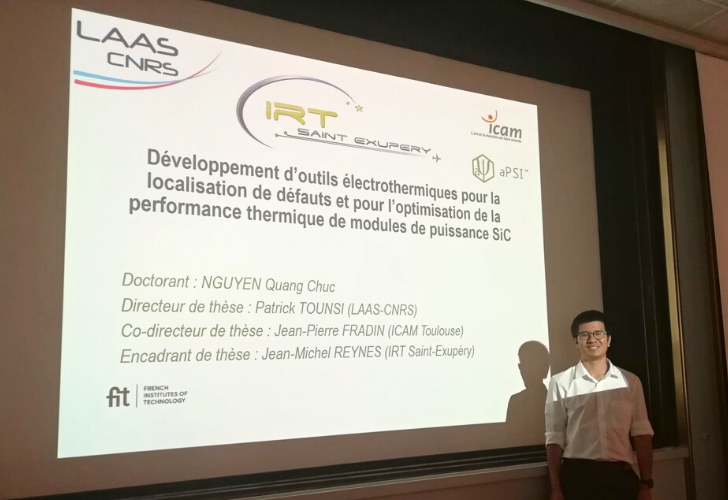On September 14, 2021, Quang Chuc Nguyen defended his thesis at the LAAS-CNRS in Toulouse. His work was supervised by the IRT Saint Exupéry, the LAAS-CNRS and the ICAM Toulouse and was registered in GEET doctoral school. This research contributed to help developing and improving high performance double-sided cooling SiC power modules.
THESIS SUBJECT
“It is necessary to develop the experimental tools of thermal characterizations and associated modeling all together.“
About this thesis
The research focused on the innovation of very high-performance Silicon Carbide-based power converters for embedded systems, in particular for automotive and aeronautical applications. SiC-based components encourage power module manufacturers to develop highly integrated power converters.
On the other hand, double-sided cooling structures allow improving thermal performances of power modules. The control of the thermal dimension and its interaction with the electrical parameters is essential to guarantee both the performance and the reliability of these modules in embedded mechatronic applications. Therefore, it is necessary to develop the experimental tools of thermal characterizations and associated modeling all together.
The work of this thesis took place in collaboration with IRT Saint Exupéry, LAAS-CNRS, ICAM Toulouse and aPSI3D.
“This thesis brings a scientific approach which contributes to a better knowledge and exploitation of new SiC-based components”
The first part of the research consisted in developing a methodology, using both experimental measurements and thermo-fluidic 3D simulations, in order to identify and locate faults within power module packages. A specific test bench for thermal impedance characterizations of double and single-sided cooling power modules was designed and implemented at ICAM Toulouse.
The second part of the research involved developing an electrothermal model of SiC power module which can help equipment manufacturers to design and optimize their power systems. This model is composed of two sub-models: a thermo-electrical one that represents SiC MOSFET characteristics and takes into account of the influence of junction temperature, a compact thermal one that represents thermal behaviors of power module’s chips (self-heating and thermal coupling between chips).
All of these actions have enabled us to offer manufacturers a diagnostic method for improving the maturation of a new SiC chip packaging technology. It also allows OEMs to have advanced electro thermal models to optimize power converters with their cooling systems. In general, this thesis brings a scientific approach which contributes to a better knowledge and exploitation of new SiC-based components taking into account the constraints brought by the new highly integrated 3D packaging.
SiC PROJECT
The SiC project revolves around Silicon Carbide-based powers converters for embedded systems which takes more and more importance in aeronautic and automotive domains. The role of this material is major in those applications, as it withstands high voltages and temperatures and reacts very quickly, which provokes remarkable reductions of the size of equipments, and this in terms of volume, weight and heat.
JURY
| Patrick TOUNSI | Thesis Director | INSA/LAAS-CNRS |
| Jean-Pierre FRADIN | Thesis Director | ICAM Toulouse |
| Cyril BUTTAY | Reviewer | INSA Lyon |
| Yvan AVENAS | Reviewer | ENSE3 |
| Hélène FREMONT | Examiner | IMS Bordeaux |
| Frédéric MORANCHO | Examiner | Toulouse III – Paul Sabatier University |
| Stéphane LEFEBVRE | Examiner | SATIE/CNAM |
| Thierry MEYNARD | Examiner | LAPLACE |
| Bernardo COGO | Guest | IRT Saint Exupéry |
| Jean-Michel REYNES | Guest | IRT Saint Exupéry |


